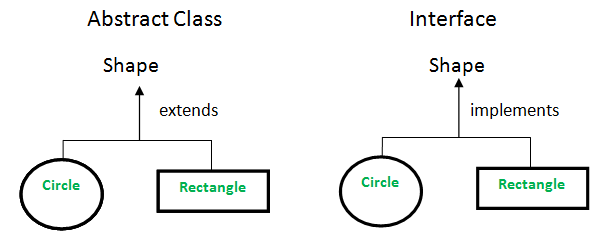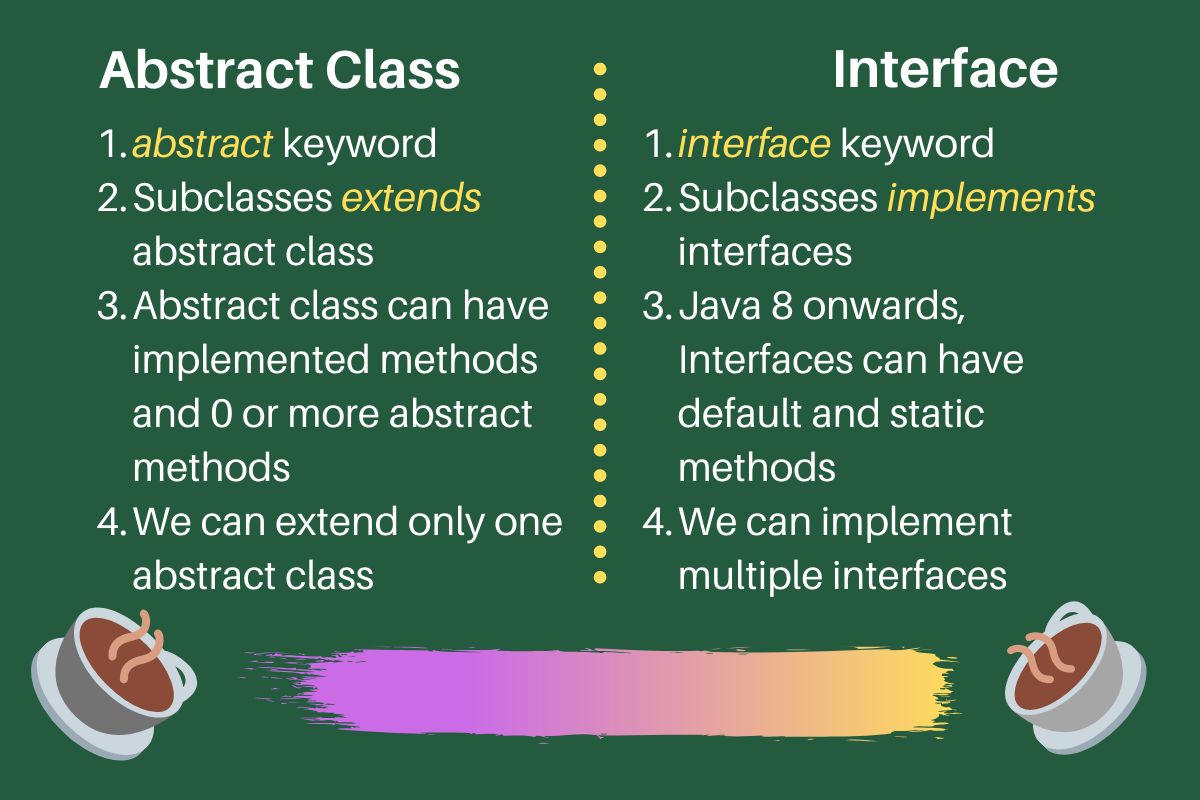Both abstract classes and interfaces are important concepts in object-oriented programming, however they both have different roles that create distinctions between the two. An abstract class is a class which provides a partial implementation of its parent or grandparent classes. On the other hand, an Interface defines methods and constants that must be implemented by any class that implements it.

Table Of Content:
- Difference between Abstract class and Interface - Javatpoint
- oop - What is the difference between an interface and abstract class ...
- Difference between Abstract Class and Interface in Java ...
- When to use an abstract class vs. interface in C# | InfoWorld
- Difference between Abstract Class and Interface in C# ...
- Difference between Abstract Class and Interface in Java | DigitalOcean
- Abstract Class vs Interface in Java – Difference Between Them
- Differences between abstract class and interface in Java
- Difference between abstract class and interface in C#
- Abstract class vs interface in Kotlin | by Marcin Moskala | Kt. Academy
1. Difference between Abstract class and Interface - Javatpoint
https://www.javatpoint.com/difference-between-abstract-class-and-interface
1) Abstract class can have abstract and non-abstract methods. Interface can have only abstract methods. Since Java 8, it can have default and static methods ...
2. oop - What is the difference between an interface and abstract class ...
https://stackoverflow.com/questions/1913098/what-is-the-difference-between-an-interface-and-abstract-classA child class can define abstract methods with the same or less restrictive visibility, whereas a class implementing an interface must define the methods with ...
3. Difference between Abstract Class and Interface in Java ...
https://www.geeksforgeeks.org/difference-between-abstract-class-and-interface-in-java/
4. When to use an abstract class vs. interface in C# | InfoWorld
https://www.infoworld.com/article/2928719/when-to-use-an-abstract-class-vs-interface-in-csharp.html
5. Difference between Abstract Class and Interface in C# ...
https://www.geeksforgeeks.org/difference-between-abstract-class-and-interface-in-c-sharp/
Jan 28, 2022 ... Abstract class can contain methods, fields, constants, etc. Interface can only contains methods, properties, indexers, events. ; It can be fully, ...
6. Difference between Abstract Class and Interface in Java | DigitalOcean
https://www.digitalocean.com/community/tutorials/difference-between-abstract-class-and-interface-in-java
7. Abstract Class vs Interface in Java – Difference Between Them
https://www.guru99.com/interface-vs-abstract-class-java.html
An abstract class permits you to make functionality that subclasses can implement or override whereas an interface only permits you to state functionality but ...
8. Differences between abstract class and interface in Java
https://www.tutorialspoint.com/differences-between-abstract-class-and-interface-in-java
9. Difference between abstract class and interface in C#
https://www.c-sharpcorner.com/UploadFile/93126e/difference-between-abstract-class-and-an-interface/
10. Abstract class vs interface in Kotlin | by Marcin Moskala | Kt. Academy
https://blog.kotlin-academy.com/abstract-class-vs-interface-in-kotlin-5ab8697c3a14
What is an abstraction class?
An abstract class is a special type of class which provides a partial implementation of its parent or grandparent classes and cannot be instantiated, but can be extended.
What does an interface do?
Interfaces define methods and constants that must be implemented by any class that implements them. These methods and constants act as contracts between objects and define how they interact with each other.
How do abstraction classes and interfaces differ?
Abstract classes provide partial implementations while interfaces define what objects must implement in order to interact with each other. Additionally, abstract classes can contain defined variables while interfaces cannot.
Can an interface extend an abstract class?
No, an interface cannot extend an abstract class because both define different types of structures for developers to use when building their applications. Interfaces require full implementations while abstract classes provide partial ones, so extending does not make sense in this case.
Conclusion:
In conclusion, both abstraction classes and interfaces play distinct roles in object-oriented programming by providing developers with different ways to structure their code and designs.
